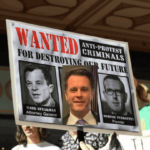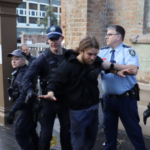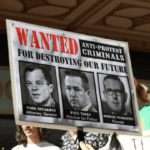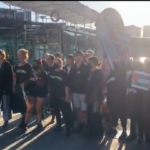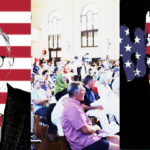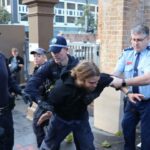NSW Government’s Strengthening of Anti-Protest Laws Is a Cheap Shot at Civil Society

The laws propose to increase penalties that apply to nonviolent protests in New South Wales.
The Minns government has once again proven it’s belligerence to community concerns, as not only did it fail to deliver on a statutorily required review of the state’s severe antiprotest regime that passed into law in early 2022 by the 1st of October deadline, but, after this delay was publicly called out on Monday, it then announced another extreme protest measure was to be introduced.
On Tuesday 12 November 2024, state attorney general Michael Daley tabled the Crimes Amendment (Obstructing a Railway) Bill 2024, which seeks to attach a steep fine onto the pre-existing offence of obstruction of a railway, contrary to section 213 of the Crimes Act 1900 (NSW), so that the crime that currently carries a maximum prison term of 2 years’ imprisonment would also have a maximum fine of $22,000 imposable in the Local Court.
The drafting of the new one page bill that makes an amendment to a law that has sat on the books in its current form since January 1988, in order to attach a fine to it that mirrors the draconian nature of the other fines now applying to the Coalition’s antiprotest regime, does feel a little like premier Chris Minns is simply laying in the boot towards his many detractors in respect of his protest stance.
The top minister and his chief lawmaker raised recent protests that obstructed the Newcastle rail line that runs through the world’s largest coal port and were staged by Rising Tide and Blockade Australia, as warranting the addition of a fine, which suggests that Labor considers the threat of a monetary penalty will be more of a deterrent than an unlikely to be imposed sentence.
These climate groups, and others like Extinction Rebellion, are part of a broader civil society coalition that has long been campaigning for the repeal of the 2022 antiprotest regime, which has been led by the NSW Council for Civil Liberties, and includes the NSW Greens, the union movement, legal associations, antiwar and social justice groups, as well as the Free Palestine movement.
Authoritarian creep
“The antidemocratic crackdown on the right to protest continues to escalate under the watchful eyes of premier Minns,” said NSWCCL president Timothy Roberts, and he added that his organisation had already raised concerns about the statutorily required missing review report into the 2022-established antiprotest regime.
“The government’s attitude demonstrates how little regard they have for good governance and accountability,” the lawyer underscored, following the release of a Minns government statement on Tuesday, outlining that it “was strengthening penalties for blocking railways to boost safety in illegal protest crackdown”.
The press release suggests that “hardworking train drivers” are in fear that they may need to “apply an emergency brake to avoid striking a trespasser”. The premier continued on in this vein, as he’s quoted as saying, “Train drivers, passengers travelling to work and companies going about their business should not have to contend with protesters on the tracks.”
The law against obstructing a railway has long carried a penalty of 2 years. This has not deterred climate defenders and environmental protesters from taking such direct action over the last 30-odd years that the offence has been sitting on the books in its current form, and climate groups told the ABC that they didn’t consider the application of a fine was going to serve as any greater deterrent.
“If anyone held a skerrick of hope that NSW Labor, under the Minns government, would reignite the light on the hill, then this is another nail in that coffin,” Roberts continued.
“The introduction of another tranche of draconian antiprotest laws represents another betrayal of the public’s trust by those who should stand to strengthen and defend civil liberties.”
Legislating for effect
The imposition of the fine appears even more pointless when considering, as Daley explained during his 12 November second reading speech on the bill, that due to the fact that there’s no actual financial penalty stipulated within section 213 of the Crimes Act, the NSW Local Court already has the ability to apply an $11,000 fine in respect to a person convicted of obstructing a railway.
Schedule 1 of the Criminal Procedure Act 1986 (NSW) lists a number of offences known as Table 1 offences, which are indictable, or serious, crimes that are dealt with summarily, or within the NSW Lower Court, unless the prosecution or defence elect otherwise. So, obstructing a railway is a Table 1 offence, and all such offences carry 2 years and/or an $11,000 fine when tried in the Lower Court.
“To deter dangerous conduct on railways, the bill will effectively double the available penalty in the Local Court for the offence in section 213 of the Act,” the NSW AG explained.
“The Local Court will now be able to impose a sentence of up to 200 penalty units, which is $22,000, or 2 years imprisonment, or both.”
Daley then suggests that “doubling the fine that can be imposed signifies to the Local Court that the government and the community take the offence seriously.”
The effectiveness of the new measure is disputable, however, especially when it comes on the back of civil society having hoped to see a rights-forward Labor come to the table and reform the Liberal-imposed antiprotest regime, as it appears the Minns government is simply doubling down upon the protest crackdown, after it had provided bipartisan support to it whilst in opposition.
The current regime
The antiprotest regime was rolled out by the Perrottet government in March/April 2022, in response to a series of successful Blockade Australia and Fireproof Australia protests that had been gaining traction in terms of the message regarding the climate crisis, and the legislative crackdown on the basic democratic right also served to emboldened police overreach in regard to protest.
The scenario that led to what MUA Sydney branch secretary Paul Keating has described as the most authoritarian protest regime on the planet, was then NSW roads minister Natalie Ward calling into the 2GB Ben Fordham show in March 2022 to complain about being made late to work due to a protest obstructing the Spit Bridge, and the AM shock jock suggested severe penalties as a response.
Ward then added clause 48 to the Roads Regulation 2018 (NSW) on 24 March, which ensured that the pre-existing offence of obstructing the Sydney Harbour Bridge, under section 144G of the Roads Act 1993 (NSW), which carried 2 years prison and/or a $22,000 fine, was then extended to cover all bridges and tunnels. And as this was delegated legislation, no vote was needed to make the change.
Then the 1 April passed Roads and Crimes Legislation Amendment Bill 2022 further broadened section 144G to apply to roads. And this legislation that was rammed through state parliament within a 48 hour period further inserted new section 214A into the Crimes Act 1900 (NSW), which applies the same harsh penalties to the offence of obstructing major facilities.
Ongoing attacks on protest
Minns hasn’t been chasing climate defenders like his predecessors were, as the NSW Labor premier has come out swinging against the pro-Palestinian antigenocide movement of the last 12 months, and of late, he’s been suggesting that because the ongoing cost of policing the more than a yearlong action is so much, NSW police should now be able to refuse protests on financial grounds.
NSW Liberal opposition leader Mark Speakman then tossed in the idea of user-pays protest policing, which involves organisers of events having to pay exorbitant prices for the saturation policing that the NSW Police Force insists must be a part of protests and festivals these days. And the imposition of user-pays was used as a way of pricing NSW festivals out of being able to take place circa 2018.
NSW police commissioner Karen Webb unsuccessfully tried to have the 52nd consecutive Free Palestine protest set to take place on Gadigal land in Sydney shut down by the courts in early October. And a subsequent attempt to have this month’s Rising Tide blockade of Newcastle Coal Port refused was successful a fortnight ago. But that protest action will be going ahead regardless.
“We remind all those elected to parliament that they have a sacred obligation to uphold democratic principles, including what they may consider ‘politically inconvenient’ civil liberties and human rights, that make our country a liberal democracy,” Roberts made clear in his statement on Tuesday.
“The council will continue to fight for the right to protest and will stand beside peaceful protestors,” the NSWCCL president said in summing up. “It is shameful that NSW continues to refuse to introduce a state-based human rights charter that would protect the right to protest.”


